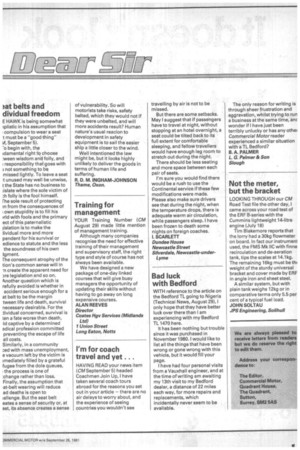at belts and dividual freedom
Page 17

If you've noticed an error in this article please click here to report it so we can fix it.
E HAWK is being somewhat iplistic in his assumption that compulsion to wear a seat t must be a "good thing" VI, September 5).
-o begin with, the
idamental right to choose :ween wisdom and folly, and responsibility that goes with ; not something to be
missed lightly. To leave a seat t unused may well be unwise, t the State has no business to lislate where the sole victim of 3h folly is the fool himself. rhe sole result of protecting
from the consequences of own stupidity is to fill his irld with fools and the primary ect of this paternalistic iislation is to make the iividual more and more pendent for his survival or edience to statute and the less the soundness of his own igment.
rhe consequent atrophy of the (ion's common sense will in 'n create the apparent need for )re legislation and so on. 4nother question which is refully avoided is whether in accident serious enough for a at belt to be the margin tween life and death, survival necessary desirable. For the lividual concerned, survival is ten a fate worse than death, Id captive by a determined edical profession committed preventing the escape of life all costs.
Similarly, in a community ed with mass unemployment, e vacuum left by the victim is imediately filled by a grateful fugee from the dole queues, the process is one of :change rather than loss. Finally, the assumption that at-belt wearing will reduce ad deaths is open to iallenge. But the seat belt eates a sense of security or, at ast, its absence creates a sense of vulnerability. So will motorists take risks, safety belted, which they would not if they were unbelted, and will more accidents result? Human nature's usual reacion to development in safety equipment is to sail the easier ship a little closer to the wind.
Well intentioned the law might be, but it looks highly unlikely to deliver the goods in terms of human life and suffering.
R. D. M. INGHAM-JOHNSON Thame, Oxon.












































